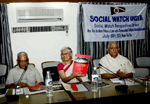“Are the Indian police a law unto themselves?”
Published on Tue, 2011-07-19 07:20
Source: Social Watch India Most of the 70,000 complaints filed every year at the National Human Rights Commission of India “are against police”, said Dr. K. S.Subramanian, former policeman and author of the report “Social Watch India Perspective Series Vol.:3”, launched last week. Social Watch India released the study on July 9th and held a policy dialogue titled “Are the Indian police a law unto themselves? A rights based assessment” at the India International Centre in New Delhi. Nearly 60 people representing civil society organizations, eminent personalities, scholars and journalists participated in the event. Ms. Indira Jaising, Additional Solicitor General of India (lawyer that represents the government before the Supreme Court) said “decriminalization of crime happens at the police station itself”. She further remarked that the Police Act of 1861 says “neglect of duty will be dealt with by [the] government”, but she noted that there is no clear definition of “neglect of duty” in the codes. . Dr. K. S. Subramanian, author of the report and former policeman, said: “According to the National Human Rights Commission, most of the 70,000 complaints filed every year are against police”. He noted that in the state of Uttar Pradesh 201 extra judicial executions are recorded per year, and more than 300 in Manipur. “The recommendation to create independent police authorities to record the complaints at the district level should be maintained. Only 12 states have done it, but they are in very bad condition.” Amitabh Behar, National Convenor of Social Watch India, said that there is a tremendous decline in civil society initiatives on civil and political rights, while most of them are focused on social and cultural matters instead. Journalist Seema Mustafa said that in the 1980s media used to work as a police watchdog, among other government institutions, while journalists used to do the job of NGOs. Seema Mustafa said that police have retreated during periods of communal violence in Assam, Punjab and Uttar Pradesh, where they exerted excessive force against Muslims. “Hundreds and hundreds of young boys were killed by police in Kashmir, but not a single policeman was suspended or questioned,” she added Retired policeman N.K. Singh said that the “attitude of the public towards the police should be changed.” “We should also look at the figures, how many policemen were killed while they were protecting civilian people in Kashmir,” he stressed. Kamal Chenoy, Chairperson of the Centre for Comparative Politics and Political Theory (School of International Studies, Jawaharlal Nehru University) said that retired bureaucrats and police officers are appointed as members of agencies like the National Human Rights Commission, where there is not even a single civil society organization as a member. “In such conditions, we cannot expect these commissions to operate at their optimum level”, he added. The event ended with a vote of thanks by Himanshu Jha, National Coordinator of National Social Watch. More information
Social Watch India Perspective Series 3: http://bit.ly/qE9x34
|


